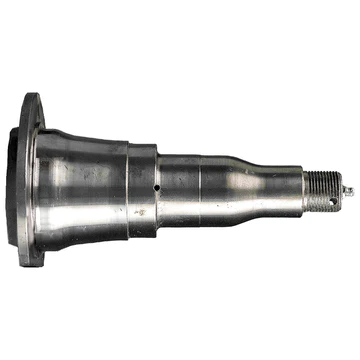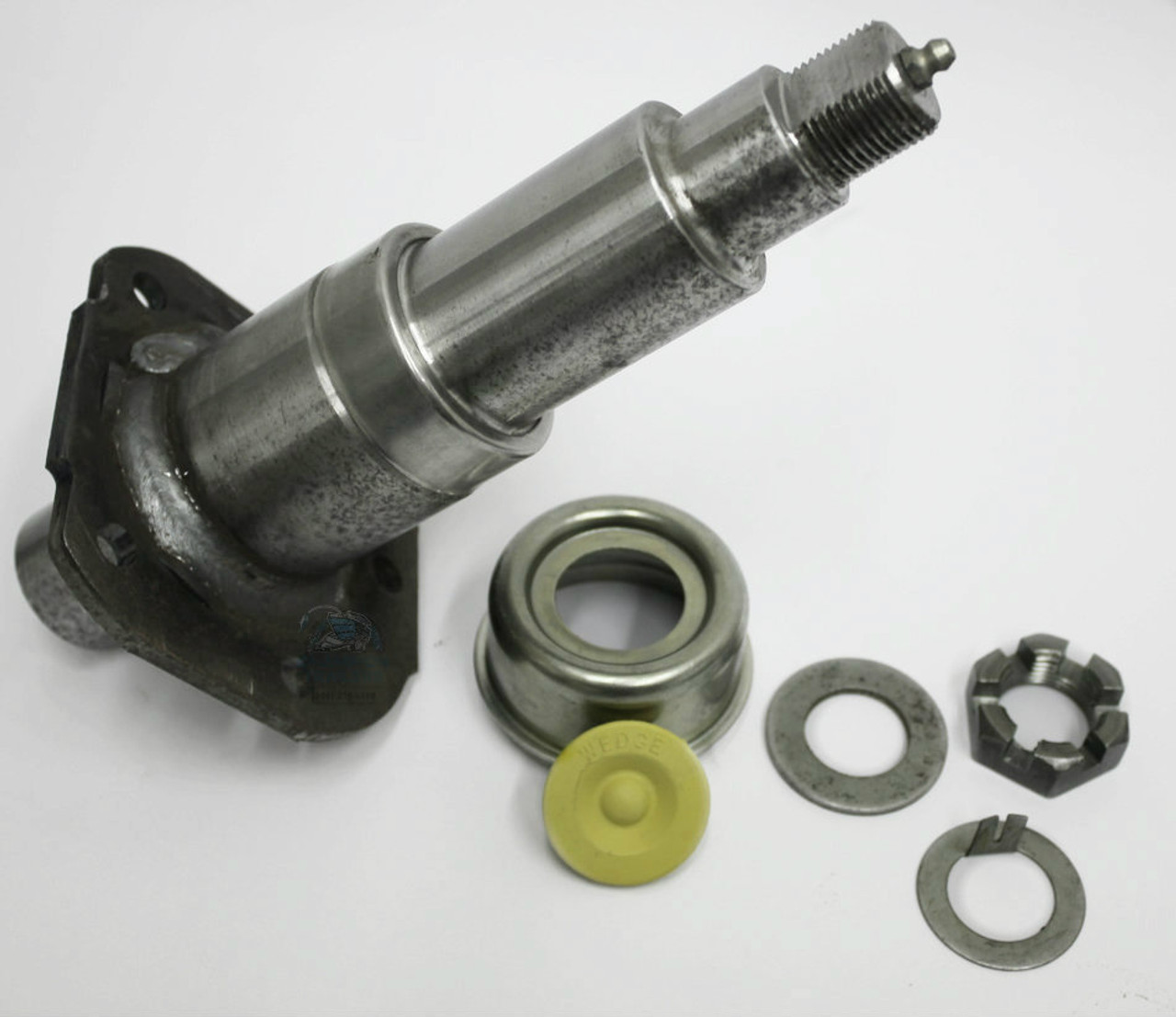Product Description
| Specs | *Application: 2,500-lb trailer axles |
| *Stub diameter: 1-5/16″ | |
| *Spindle capacity: 1,250 lbs | |
| *Overall spindle length: 6-11/16″ | |
| *Brake flange configuration: 4 bolt | |
| Bearings | Inner bearing: L44649 (1.063″ inner diameter) |
| Outer bearing: L44649 (1.063″ inner diameter) | |
| Races | Inner race: L44610 |
| Outer race: L44610 | |
| Grease seal | Inner diameter: 1.50″ |
| Outer diameter: 1.987″ |
| Condition: | New |
|---|---|
| Axle Number: | 2/3 |
| Application: | Trailer |
| Certification: | ISO |
| Material: | Steel |
| Type: | Rear Axles |
| Customization: |
Available
|
|
|---|

Are there innovations or advancements in trailer spindle technology that have emerged recently?
Yes, there have been notable innovations and advancements in trailer spindle technology that have emerged recently. Here’s a detailed explanation:
Trailer spindle technology has continued to evolve to improve the performance, durability, and safety of trailers. Some of the recent innovations and advancements include:
- Sealed Bearing Systems: Sealed bearing systems have become increasingly popular in trailer spindle technology. These systems feature integrated seals that provide enhanced protection against contaminants such as dirt, water, and debris. The sealed design helps to prolong the life of the bearings by reducing the risk of premature wear and damage. It also minimizes maintenance requirements by eliminating the need for regular bearing re-greasing.
- Improved Bearing Materials: Recent advancements have led to the development of advanced bearing materials for trailer spindles. Materials such as ceramic and advanced polymers offer superior strength, corrosion resistance, and durability compared to traditional steel bearings. These advanced bearing materials contribute to extended bearing life, reduced friction, and improved overall performance of the trailer spindles.
- High-Strength Spindle Construction: Manufacturers have been focusing on improving the strength and durability of trailer spindles. This includes the use of high-strength materials such as forged steel or alloy steel in the construction of spindles. These materials provide increased load capacity, enhanced resistance to bending or deformation, and improved structural integrity, ensuring reliable and safe towing operations.
- Intelligent Monitoring Systems: Some advancements in trailer spindle technology have introduced intelligent monitoring systems. These systems utilize sensors and advanced electronics to monitor spindle performance in real-time. They can detect abnormalities such as excessive heat, vibration, or bearing wear and provide early warning alerts to the operator. Intelligent monitoring systems help prevent potential failures, reduce downtime, and enhance overall safety during towing.
- Enhanced Corrosion Resistance: With a focus on improving the longevity of trailer spindles, advancements have been made in enhancing corrosion resistance. This includes the use of specialized coatings, surface treatments, or materials that provide superior protection against corrosion caused by factors like moisture, salt, or harsh environmental conditions. Enhanced corrosion resistance helps to prolong the lifespan of the spindles and ensures their optimal functionality over an extended period.
These recent innovations and advancements in trailer spindle technology have contributed to improved performance, increased durability, and enhanced safety in towing systems. They address common challenges such as bearing maintenance, corrosion, load capacity, and monitoring, providing trailer owners with more reliable and efficient options for their towing needs.
It’s important to note that the availability and implementation of these advancements may vary among different manufacturers and models of trailers. When considering the latest innovations in trailer spindle technology, it’s advisable to consult with manufacturers, industry experts, or trusted suppliers to explore the specific features and benefits offered by different spindle systems.

Can you share tips for troubleshooting common issues with trailer spindles in towing applications?
Troubleshooting common issues with trailer spindles is crucial for maintaining safe and efficient towing operations. Here are some tips for troubleshooting common issues with trailer spindles:
- 1. Excessive Play or Movement: If you notice excessive play or movement in the trailer wheels when jacked up or during towing, it may indicate worn-out or damaged spindles. In such cases, check for loose or worn-out bearings, insufficient lubrication, or misaligned spindles. Tighten or replace loose or worn-out bearings, ensure proper lubrication, and adjust spindle alignment if necessary.
- 2. Abnormal Noises: Unusual noises, such as grinding, squeaking, or rumbling sounds, coming from the trailer wheels while in motion can be a sign of spindle problems. Inspect the bearings for wear or damage and replace them if necessary. Ensure proper lubrication of the bearings and verify that the hub and spindle assembly are properly seated and tightened.
- 3. Irregular Tire Wear: Check for uneven or abnormal tire wear patterns, such as cupping, feathering, or bald spots. This can indicate misaligned or damaged spindles. Verify that the tires are properly inflated and balanced. If the wear patterns persist, consider having the spindles and suspension system inspected for misalignment or other issues.
- 4. Overheating: Excessive heat in the trailer spindles can be a result of inadequate lubrication, worn-out bearings, or improper adjustment. Ensure that the bearings are properly lubricated using the manufacturer’s recommended grease. If overheating persists, inspect the bearings for damage and replace them if necessary.
- 5. Grease Leaks: Check for grease leaks or contamination around the spindle area. Inspect the spindle seal for damage and replace it if necessary. Clean any grease buildup and ensure that the grease fittings are properly tightened to prevent leaks.
- 6. Visual Inspection: Regularly visually inspect the spindles for any signs of damage, corrosion, or wear. Look for cracks, fractures, or deformities in the spindle structure. Check for rust or corrosion that can weaken the spindle’s integrity. Additionally, inspect the spindle nuts and bolts for tightness and replace any missing or damaged components.
- 7. Regular Maintenance: Implement a regular maintenance schedule for the trailer spindles. This includes greasing the bearings as recommended by the manufacturer, inspecting the spindles for wear and damage, and addressing any issues promptly. Following a maintenance routine helps prevent potential problems and ensures the longevity and reliability of the spindles.
It’s important to note that if you are uncertain about troubleshooting or fixing issues with trailer spindles, it is advisable to seek the assistance of a qualified mechanic or trailer specialist. They can provide expert guidance and perform thorough inspections and repairs to ensure the safety and proper functioning of the trailer spindles in towing applications.

Can you describe the factors to consider when selecting trailer spindles for specific applications?
When selecting trailer spindles for specific applications, several factors should be taken into consideration. Here’s a detailed explanation of the factors to consider:
- Trailer Type and Purpose:
The type of trailer and its intended purpose play a significant role in determining the appropriate spindles. Different trailers, such as utility trailers, boat trailers, RV trailers, or horse trailers, have varying weight capacities, load requirements, and operating conditions. Understanding the specific trailer type and purpose helps in selecting spindles that can handle the expected loads and provide optimal stability.
- Load Capacity:
The load capacity of the trailer is a crucial consideration when selecting spindles. It is important to determine the maximum weight the trailer will carry, including the weight of the cargo or equipment. Spindles must be chosen to accommodate the expected load capacity to ensure safe and reliable operation.
- Wheel Size and Configuration:
The size and configuration of the trailer wheels are important factors in spindle selection. The spindle should be compatible with the wheel hub assembly and match the wheel bolt pattern. Additionally, the spindle may need to accommodate specific wheel sizes or tire configurations, especially in trailers where different wheel sizes are used.
- Environmental Factors:
The operating environment of the trailer should be considered when selecting spindles. For trailers exposed to corrosive environments, such as boat trailers used in saltwater, spindles with corrosion-resistant coatings or materials should be chosen to ensure durability and longevity.
- Compatibility with Axle and Suspension:
The spindle should be compatible with the trailer’s axle and suspension system. Consideration should be given to the type of axle (leaf spring, torsion, etc.) and the suspension configuration to ensure proper fit and functionality. The spindle should work in conjunction with the axle and suspension system to provide optimal stability and performance.
- Manufacturer Recommendations:
It is important to consult the trailer manufacturer’s recommendations or specifications when selecting spindles. The manufacturer’s guidelines provide valuable information about the appropriate spindle type, size, and other factors specific to the trailer model. Following the manufacturer’s recommendations helps ensure compatibility and adherence to safety standards.
- Regulatory Requirements:
Depending on the region and specific trailer application, there may be regulatory requirements or standards that dictate the selection of spindles. It is essential to be aware of and comply with these regulations to ensure legal operation and safety compliance.
- Expert Advice:
When in doubt or faced with unique trailer requirements, seeking expert advice from trailer manufacturers, suppliers, or industry professionals is recommended. They can provide valuable insights and recommendations based on their expertise and experience.
In summary, when selecting trailer spindles for specific applications, it is important to consider factors such as the trailer type and purpose, load capacity, wheel size and configuration, environmental factors, compatibility with axle and suspension, manufacturer recommendations, regulatory requirements, and seek expert advice when needed. Taking these factors into account ensures the appropriate selection of spindles that can handle the load, provide stability, and meet the specific requirements of the trailer and its intended use.


editor by CX 2023-12-04